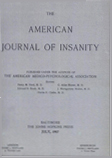THE EFFECTS OF EXERCISE UPON THE RETARDATION IN CONDITIONS OF DEPRESSION
Abstract
The results of these studies may be summed up as follows:
1. The thresholds of pain and pressure appreciation are higher than normal in a case of retardation.
2. There is a daily improvement in the pressure and pain sensibility coincident with the lessening of the retardation and the depression.
3. The accuracy of movement is not affected by depression and retardation.
4. The speed of movement is lessened in the retarded condition, but it is gradually increased during the period of recovery.
5. Mechanical vibration increases the rapidity of movement, and lowers the pain and the pressure thresholds.
6. The speed of mental processes is increased with improvement in the mental condition of retardation.
7. After moderate exercise there is more improvement than after a similar resting period.
Access content
To read the fulltext, please use one of the options below to sign in or purchase access.- Personal login
- Institutional Login
- Sign in via OpenAthens
- Register for access
-
Please login/register if you wish to pair your device and check access availability.
Not a subscriber?
PsychiatryOnline subscription options offer access to the DSM-5 library, books, journals, CME, and patient resources. This all-in-one virtual library provides psychiatrists and mental health professionals with key resources for diagnosis, treatment, research, and professional development.
Need more help? PsychiatryOnline Customer Service may be reached by emailing [email protected] or by calling 800-368-5777 (in the U.S.) or 703-907-7322 (outside the U.S.).



